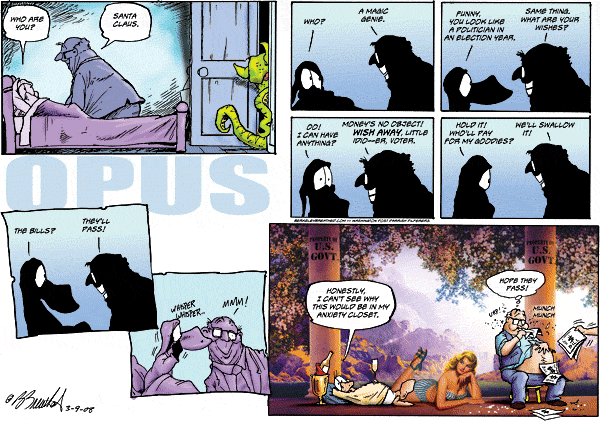March 13, 2008
Synchronicity in the funny papers
According to Carl Jung, the fact of "acausal parallelism", in the form of "temporally coincident occurrences of acausal events", provides evidence for the existence and nature of the collective unconscious. That's what I was taught in college, anyhow. That argument never seemed to me to make a particle of sense, but neither did many of the other things I was taught in college.
Anyhow, a couple of days ago, there was an amazing example of synchonicity in the comics. Two nationally-syndicated strips featured (different) bad puns on the same not-especially-common word.
First, there was Frank & Ernest for Tuesday 3/11/2008:

Among the 12 transitive (verbal) senses given for pass in the American Heritage Dictionary, that's "pass the ketchup" in sense 9b. To hand over to someone else: Please pass the bread. vs. sense 5b. To cause or allow to go through a trial, test, or examination successfully: The instructor passed all the candidates.
Then there was Opus for the week starting Sunday 3/9/2008:

Among the 19 intransitive senses for pass in the AHD, that "hope they pass" is simultaneously used in sense 16. To be approved or adopted: The motion to adjourn passed. and in sense 18. To be voided: Luckily the kidney stone passed before she had to be hospitalized.
According to the word frequency lists from Geoffrey Leech, Paul Rayson and Andrew Wilson, Word Frequencies in Written and Spoken English, the verb pass has a frequency of 136 per million in written English, and 212 per million in spoken English. It's ranked as the 110th commonest (lemmatized) verb and the 1,862nd most common (unlemmatized) word overall.
So what're the odds of two nationally-syndicated comic strips featuring puns on this word on the same time? We could set up a sort of birthday-paradox version of the Drake equation for it, based on the estimated probability that a random day's comic strip will be based on a pun (1 in 100?), the number of nationally-syndicated comic strips (100?), and the conditional probability of choosing a particular word given the choice to base a comic strip on a pun (which we could estimate crudely in terms of relative word frequency, here about 150/1,000,000).
Any way you fill it in, it's an amazing coincidence. But what does it have to do with the collective unconscious? I mean, aside from the image in the last panel of FEMA-procured Elysium (complete with supporting cast from QAT International...)
[Note also that this is not the first time that we've had occasion to take note of comic-strip synchronicity: see "The perils of comic-strip lead time", 2/25/2007.]
[OK, two readers have already sent in sketches of theories about puns as quantum entanglement. I wish I could think of something funny to say about this.]
Posted by Mark Liberman at March 13, 2008 07:48 AM